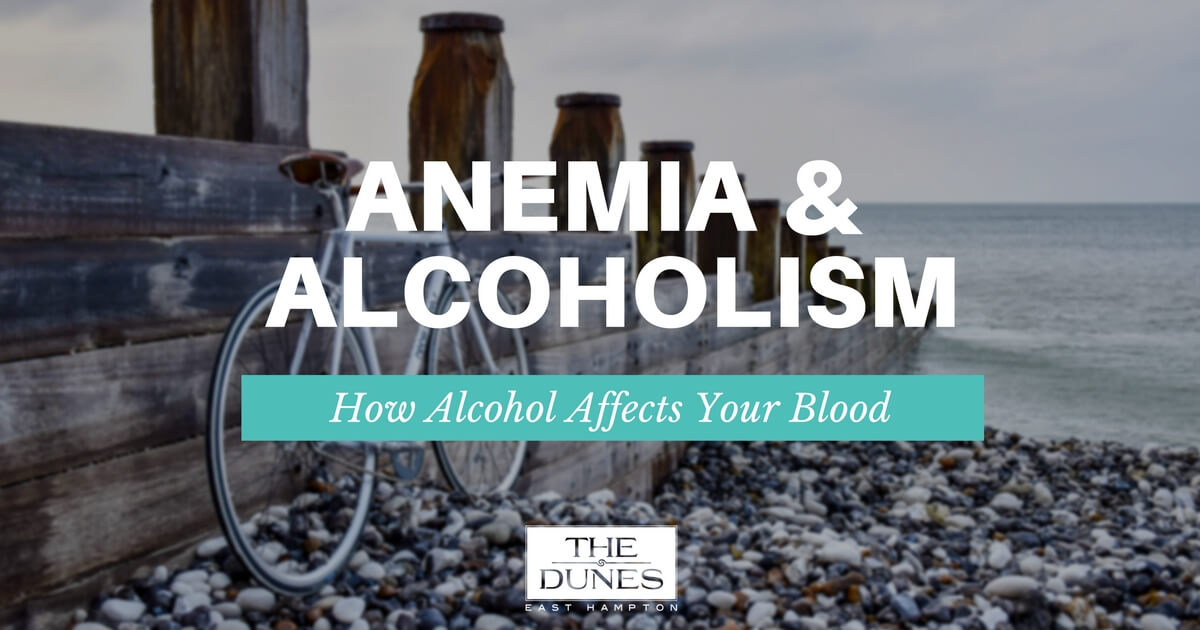
Alcohol has many negative health consequences, from acute hepatitis to cirrhosis of the liver. Its effect on the liver, for instance, is relatively well known. What about the relationship between alcoholism and anemia? Alcohol abuse can lead to certain types of anemia with long-term consequences.
What Is Anemia and is Anemia Dangerous?
Anemia is an umbrella term to describe a lack of healthy red blood cells. Patients with anemia may experience:
- Fatigue
- Weakness
- Shortness of breath
- Headaches
- Dizziness
- Chest pain
It’s the most common blood disorder in the United States and it comes in many forms, including:
- Iron deficiency
- Folic Acid deficiency
- Vitamin B12 deficiency
The relationship between anemia and alcoholism is multifactorial. The resulting type of anemia depends on lifestyle factors and comorbidities.
The Anemia and Alcohol Connection
Poor nutrition is a risk factor for anemia in many alcoholics. Many of us get the nutrients we need for healthy blood production from the foods we eat. For example, shellfish, dairy products, red meat, eggs and fortified cereals are rich in vitamin B12.
Iron-rich foods include dark leafy greens, beans, fortified grains and most types of meat. By incorporating variety into our diets, we get the vitamins and minerals we need – such as B12 and iron – to produce enough healthy red blood cells without a second thought.
Alcoholics, however, may neglect to eat regularly or may vomit due to excessive alcohol consumption. When empty alcohol calories replace healthy food calories and nutrients, alcoholics are at risk for nutritional deficiency anemia. A holistic treatment may be necessary to get people in alcohol addiction treatment back on the right track.
Direct Toxic Effects Of Anemia and Alcoholism
While dietary intake plays a role in alcohol-related anemias, alcohol also has a direct toxic effect on blood production. Specifically, alcohol affects bone marrow and suppresses the normal production of red blood cells (RBCs). Chronic, excessive consumption of alcohol can lead to abnormal structure of RBCs and the presence of macrocytes (enlarged RBCs), a condition known as macrocytosis.
Macrocytosis And Anemia
Macrocytosis can be attributed to alcoholism whether or not there is liver disease present. In alcoholics, macrocytosis is often indicative of poor absorption of B12 and alcohol or folic acid. B12 deficiency anemia has these unique symptoms, which may be mild at first:
- Diarrhea or constipation
- Loss of appetite
- Pale skin
- Swollen, bleeding gums
B12 and Alcohol – Over time, as B12 stores deplete within the body, symptoms may become more severe, such as:
- Problems concentrating
- Mental confusion
- Numbness or tingling in the hands and feet
- Depression
Poor B12 absorption can be due to nutritional deficiencies or structural abnormalities of the RBCs.
Hemolytic Anemia In Alcoholics
Alcoholics are more likely to suffer from a specialized type of anemia called hemolytic anemia. Our red blood cells are disc- or donut-shaped, with a circle in the middle called a neutrophil. Hemolytic anemia occurs when this shape is compromised, leading to a shortened life span. This is where the relationship between anemia and alcoholism gets particularly dangerous.
Hemolytic anemia may result in a spur-shaped RBC or the neutrophil may be abnormally structured. When these cells die, the bone marrow can’t produce enough to meet the body’s demands.
How Is Anemia Treated?
How a physician treats anemia depends on the underlying cause. In B12 or folic acid deficiency anemia, a proper diet may improve the condition. Patients may need B12 shots regularly until the body’s stores replenish.
For hemolytic anemia, patients may need blood transfusions to keep up with the rapid rate of cell death. Depending on its severity, hemolytic anemia ranges from asymptomatic (showing no signs) to potentially fatal.
Outlook And Prognosis
The patient outlook for alcohol-related anemia is good, provided he or she addresses the alcohol abuse. A comprehensive treatment plan includes:
- A well-balanced diet rich in B12, folic acid, iron, proteins, fats and complex carbohydrates
- Participation in an alcohol rehabilitation program
- Attending all doctor’s appointments until the condition is under control
Fortunately, even many of the structural abnormalities associated with hemolytic anemia and macrocytosis can correct themselves after a patient abstains from alcohol. In cases of severe liver damage, however, a patient may need lifelong treatment.
Getting A Patient Into Treatment
Anemia is dangerous. Effective intervention can stop – and even reverse – some of the physiological effects of alcohol. If a loved one suffers from alcohol abuse, then try to help him or her enroll in a quality treatment program. Early intervention is essential for the best patient outcomes.
Click the button below and speak to one of our addiction treatment specialists today.







